When will the 7 billionth human be born?
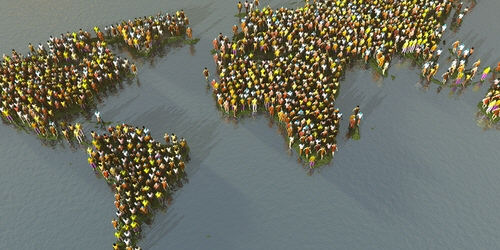
On 31 October, a newborn baby somewhere in the world will become the 7 billionth member of the human race. Or so says the UN – alternatively, this date could be at least a year too early. Behind the UN’s patina of certainty may lie outdated and unreliable census data. The suspicion is that millions of births and deaths have not been counted and there is huge uncertainty about the rate at which women are giving birth.
The precise “day of 7 billion” may not matter much. But the inaccuracies make it harder to answer a more important question: is human population set to peak within the next few decades or will it carry on growing beyond that?
Wolfgang Lutz of the Vienna Institute of Demography says the UN is “under political pressure to disregard uncertainty and name a date” for 7 billion. But he and colleague Sergei Scherbov estimate that the world probably won’t reach 7 billion until early in 2013, though it could be as late as 2020.
The director of the UN population division Hania Zlotnik defends her data but agrees that “an interval of a few months or even a year would be a reasonable range of uncertainty“.
One problem for demographers is undercounting. Even developed countries reckon their censuses miss up to 3 per cent of people. Up-to-date figures have to adjust for both this and the changes since the last census, which could be decades in the case of some African countries. So adjusting for extra people is routine.
The big danger may be overadjusting. The world has seen a dramatic decline in fertility in recent years, with the average woman now having only 2.5 children, half as many as her grandmother 50 years ago. So there may be far fewer new arrivals than demographers assume.
Take China, the world’s largest country. Raw census data suggest that the average woman has 1.2 children, but this hides a multitude of problems. State demographers believe people are hiding tens of millions of babies to evade the one-child policy, and so estimate that the rate is 1.8. But Zhongwei Zhao of the Australian National University in Canberra says other figures in the 2010 census suggest the raw data may be nearer the truth. The UN currently plumps for 1.5 children per woman. Discrepancies in estimating populations are amplified in long-term projections. Zhao says China’s recent overadjusting of its fertility rate will turn into an overestimation of as much as 100 million by 2030.
India’s demographic future is even more uncertain. The UN estimates that the country’s population will grow from 1.2 billion to 1.7 billion by 2050, making it substantially bigger than China. But Scherbov and Lutz predict 1.4 billion, with a possible range from 1.1 to 1.7 billion.
All this is of huge importance for the planet. Earlier this year, the UN unexpectedly raised its estimates of future population, suggesting that the world would have more than 10 billion people by 2100. But Scherbov says there is no demographic evidence to justify this gloomier prediction. It arose from “a new set of assumptions about future fertility”. For instance, following what Zlotnik calls “a major change in methodology”, the UN upped its estimate of the number of children Nigerian women will be having in 2050 from 2.41 to 3.41.
The UN says world population will still be rising in 2100. Scherbov says there is an 85-per-cent chance it will have peaked by then. But nobody knows for sure. (NewScientist)
World Population Clock
The United Nations released the “2010 Revision of the World Population Prospects” (May 3, 2011) in which they raised their previous global demographic projections and now estimate that world population will reach 7 Billion on October 31, 2011. The US Census Bureau has a lower estimate, for which the 7 billion mark will only be reached in February 2012.
Latest official current world population estimate, for mid-year 2010, is estimated at 6,852,472,823.
The chart below shows past world population data back to the year one and future world population projections through the year 2050.
World Population Growth
| Year | Population |
| 1 | 200 million |
| 1000 | 275 million |
| 1500 | 450 million |
| 1650 | 500 million |
| 1750 | 700 million |
| 1804 | 1 billion |
| 1850 | 1.2 billion |
| 1900 | 1.6 billion |
| 1927 | 2 billion |
| 1950 | 2.55 billion |
| 1955 | 2.8 billion |
| 1960 | 3 billion |
| 1965 | 3.3 billion |
| 1970 | 3.7 billion |
| 1975 | 4 billion |
| 1980 | 4.5 billion |
| 1985 | 4.85 billion |
| 1990 | 5.3 billion |
| 1995 | 5.7 billion |
| 1999 | 6 billion |
| 2006 | 6.5 billion |
| 2009 | 6.8 billion |
| 2011 | 7 billion |
| 2025 | 8 billion |
| 2043 | 9 billion |
| 2083 | 10 billion |
World population had reached 6 billion in 1999. According to the United Nations the 6 billions figure was reached on October 12, 1999(celebrated as the Day of 6 Billion). According to the U.S. Census Bureau instead, it was reached on July 22, 1999, at about 3:49 AM GMT. Yet, according to the U.S. Census web site, the date and time of when 6 billion was reached will probably change because the already uncertain estimates are constantly being updated.
What was the population of the world in the past?
The chart above clearly illustrates how world population has changed in history. The US Census Bureau has assembled a table with estimated population from 10000 BC to 1950 according to different sources.
At the dawn of agriculture, about 8000 B.C., the population of the world was approximately 5 million. Over the 8,000-year period up to 1 A.D. it grew to 200 million (some estimate 300 million or even 600, suggesting how imprecise population estimates of early historical periods can be), with a growth rate of under 0.05% per year.
A tremendous change occurred with the industrial revolution: whereas it had taken all of human history until around 1800 for world population to reach one billion, the second billion was achieved in only 130 years (1930), the third billion in less than 30 years (1959), the fourth billion in 15 years (1974), and the fifth billion in only 13 years (1987). During the 20th century alone, the population in the world has grown from 1.65 billion to 6 billion.
How fast is the world population growing right now?
 Population in the world is currently growing at a rate of around 1.10% per year. The average population change is currently estimated at around 75 million per year.
Population in the world is currently growing at a rate of around 1.10% per year. The average population change is currently estimated at around 75 million per year.
Annual growth rate reached its peak in the late 1960s, when it was at 2% and above. The rate of increase has therefore almost halved since its peak of 2.19 percent, which was reached in 1963, to the current 1.15%. The annual growth rate is currently declining and is projected to continue to decline in the coming years, but the pace of the future change is uncertain. Currently, it is estimated that it will become less than 1% by 2020 and less than 0.5% by 2050.
This means that world population will continue to grow in the 21st century, but at a slower rate compared to the recent past. World population has doubled (100% increase) in 40 years from 1959 (3 billion) to 1999 (6 billion). It is now estimated that it will take a further 42 years to increase by another 50%, to become 9 billion by 2042.
United Nations projections indicate that world population will nearly stabilize at just above 10 billion persons after 2200.
How many people have ever lived on earth?
It was written during the 1970s that 75% of the people who had ever been born were alive at that moment. This was grossly false.
Assuming that we start counting from about 50,000 B.C., the time when modern Homo sapiens appeared on the earth (and not from 700,000 B.C. when the ancestors of Homo sapiens appeared, or several million years ago when hominids were present), taking into account that all population data are a rough estimate, and assuming a constant growth rate applied to each period up to modern times, it has been estimatedthat a total of approximately 106 billion people have been born since the dawn of the human race, making the population currently alive roughly 6% of all people who have ever lived on planet Earth.
Others have estimated the number of human beings who have ever lived to be anywhere from 45 billion to 125 billion, with most estimates falling into the range of 90 to 110 billion humans. (Worldometers)

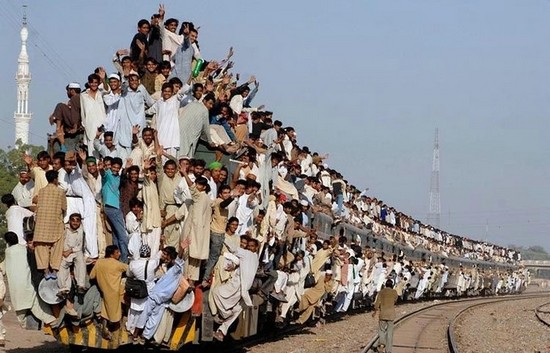
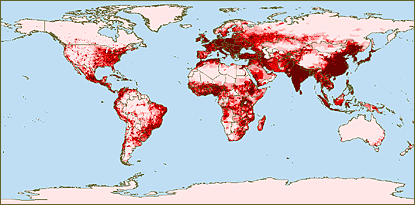
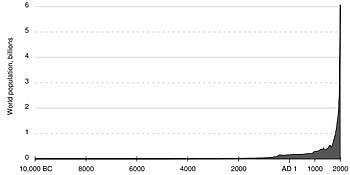
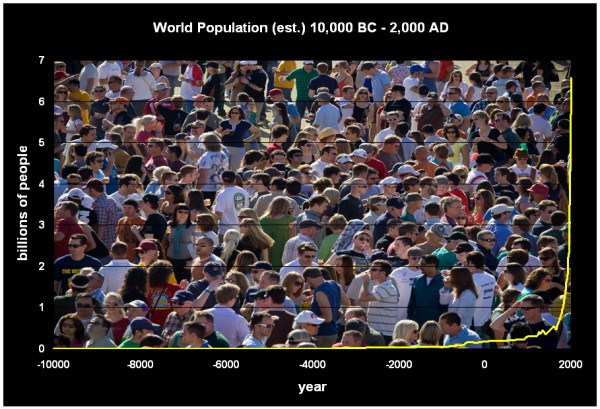
[…] be practical just for a moment, the world’s population, reported only today as likely to reach 7 billion by the end of this month, is hardly in need of additional growth. Thankfully, our future successful existence does not […]
Well, since the dawn of the human race 105 billion or so is in thousands of years, but nowday 7 BILLIONS are all toghether LIVING at the same time. It is too much for the LIFE and something will occur in the next years to stop this situation and to rule by a self control the births, until an amount each year CAN BE affordable for this LIFE. Something very hard and strong will cause the change, like a total shift in the planet. I don´t know if it will be gradually or suddenly, but the planet will do.
TAKE CARE!!!